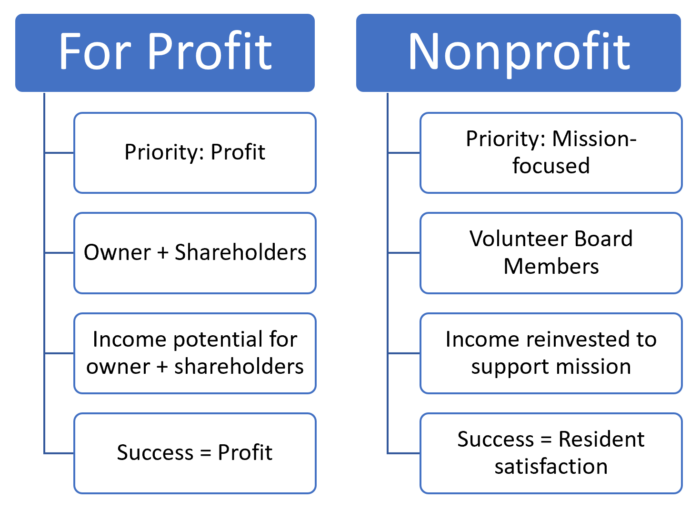Long-Term Care: Nonprofit vs. For Profit
If you’re searching for a long-term care provider for yourself or a loved one, there are so many things to consider. Trusting someone else with your loved one’s health and well-being is challenging, but circumstances may arise that make it necessary. If you, or someone you know, is researching care options, a great place to start is understanding the difference between nonprofit and for-profit facilities.
There are many differences between the two – business structure, how they are regulated, and, in some cases, how they provide and care for patients. Both are capable of delivering a high level of care. However, understanding the differences between the two is helpful as you research your options.
As the for-profit name indicates, the primary objective of this type of facility is to make money. An owner and shareholders lead the business, and due to its structure, there is income potential for those at the top. While nonprofit facilities hope to finish the year in the green, they’re led by volunteer board members and must reinvest returns using funds to support the mission described in their charters. At the end of the year, success is measured differently – in annual profit/loss statements for for-profit facilities and resident satisfaction for nonprofit facilities.

Unfortunately, the priority of making a profit can come at the expense of providing the highest quality of care for residents. There have been two recent events in the long-term care industry that have reinforced this concern:
- Research regarding the minimum staffing mandate has shown that 90% of for-profit facilities would need to hire additional nursing staff compared with 60% of nonprofit and government facilities.
- Six studies evaluated whether for-profit versus nonprofit status was associated with COVID-19 outcomes. All six concluded that for-profit nursing facilities are at a higher risk of COVID-19 cases and deaths.
While concern regarding for-profit facilities is valid, it is also worth noting that many private sector long-term care providers are quality providers of care and services. Understanding the differences is vital so you can be empowered to research and ask questions as you search for the best solution to care for your loved one.
If you are searching for a long-term care provider, I can’t let this post end without asking you a favor – would you please consider Loretto, a nonprofit long-term care provider? We have had the opportunity to do some exciting and innovative things with the monies we’ve reinvested into our mission: “to be a family of exceptional people, caring for and about each other.” From independent and assisted living to skilled nursing and memory care, we are here to provide the best care possible for you or your loved one. You can learn more about Loretto here.

